- Details
-
Published: Monday, 12 March 2012 11:02
New Threats and Intimidation towards Mining Opponents in Cabañas
Another case of intimidation towards anti-mining activists in Cabañas was reported by the Environmental Committee of Cabañas. Below is a translation of their description and call to action.
Complaint
Monday March 5, 2012
Translated by Jan Morrill
The Compañera, Maria Graciel del Carmen Funes, member of the board of the Environmental Committee of Cabañas (CAC) on February 17, 2012 went to a parents meeting at the San Francisco El Dorado School in the municipality of San Isidro in Cabañas. During the meeting Julio Eduardo Rodriguez spoke about the construction of a wall around the perimeter of the school, and he said it was being financed with funding from Pacific Rim, which was interested in mining for gold in silver in the area. He said that if someone disagreed with the project, that they should say so at that time, and that is when Graciela Funes said that she disagreed because of the damages that that company had done and could do in the future. She was then questioned by teachers from the school (Ana María Segovia, Sandra Rivas, Maritza Juarez, Marta Lilian Sigaran and Julio Eduardo Rodriguez) who also told her it was her fault the mining project was not being carried out. They provided the space for other students’ mothers and fathers to verbally attack her and it almost got to the point of physical attack. At that point she asked one of the teacher’s advisors (named Merino) to intervene but what he wound up doing was congratulating the rest of those present for the project they were planning with Pacific Rim funds.
This is another example of how the mining company uses money to divide communities and how ministry of education officials, specifically from that school, are contributing to this conflict, without worrying about the fact that they are putting the life of a mother at risk. After the meeting, Graciela has been followed and surrounded by people of questionable reputations, and she fears for her life. The education employees are also ignoring statements made by the President in which he stated that no government institution should accept funding from private businesses. Today, it is once again made clear that mining companies continue to create problems in communities and that is how violence is carried out in Cabañas.
• We call on the Ombudsman for Human Rights Office to pay close attention to these new acts of violence against our compañera.
•We demand that the Minister of Education look at this case and not allow that teachers become involved in these mining company projects, because this creates conflict in the communities.
• We demand that the Attorney General’s Office and the Civilian National Police pay attention to these new actions against environmentalists in Cabañas and that they provide protection for their lives. Also, that the rest of the cases that have been left in impunity are clarified because the impunity gives way for more cases of violence in Cabañas.
• We ask that national and international organizations pay attention to the situation that we are still facing in our department, a situation that puts the life at risk of those who are defending life.
• As an Association we would like to be clear that in spite of everything that has happened (threats, intimidation, and even murders) we will not stop in the struggle that we have begun and that we are willing to give everything to defend life and the environment.
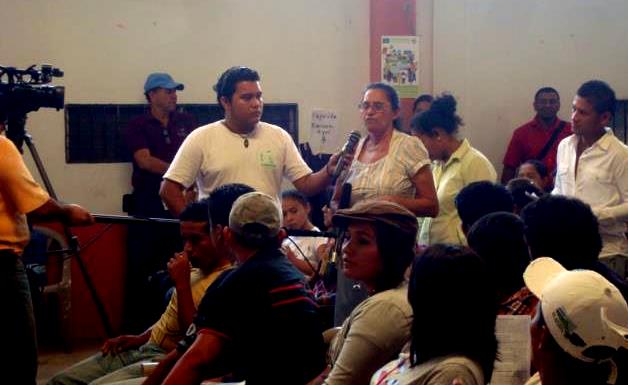
- Details
-
Published: Monday, 12 March 2012 10:26
Political Candidates Answer to Anti-Mining Activists in San Salvador and Cabañas
March 2012
Monday March 5, the National Roundtable against Metallic Mining in El Salvador (The Mesa in Spanish) together with the Ombudsman for Human Rights Office and the Association of Participatory Radios and Programming of El Salvador (ARPAS) organized a forum for candidates running for the Legislative Assembly to discuss a mining ban in El Salvador.
 Candidates from four political parties and one independent candidate participated in the forum. The parties represented were the FLMN, the PNL, the CN (formerly the PCN), the PP, as well as independent candidate William Huezo. The ARENA party had confirmed their participation but did not show up. GANA and the PDC never responded to the invitation.
Candidates from four political parties and one independent candidate participated in the forum. The parties represented were the FLMN, the PNL, the CN (formerly the PCN), the PP, as well as independent candidate William Huezo. The ARENA party had confirmed their participation but did not show up. GANA and the PDC never responded to the invitation.
Over 200 participants packed into the conference room for the event, which began with presentations by the Ombudsman for Human Rights, Dr. Oscar Luna, as well as Dr. Angel Ibarra in representation of the Mesa.
The forum got exciting when the candidates were invited to speak for 10 minutes on whether their party supported a banning mining in El Salvador or not. The only parties that definitively came out for the ban were the FMLN and the PNL (even though the PNL’s support was stated during the question and answer period by the coordinator of the party who was in the audience and not by the panelist candidate during his presentation). Taking their surroundings into account, the other candidates gave lip service to the abuses of transnational corporations and the need to protect natural resources while being sufficiently vague on the issue of legislation so as to not give a specific position on the ban.
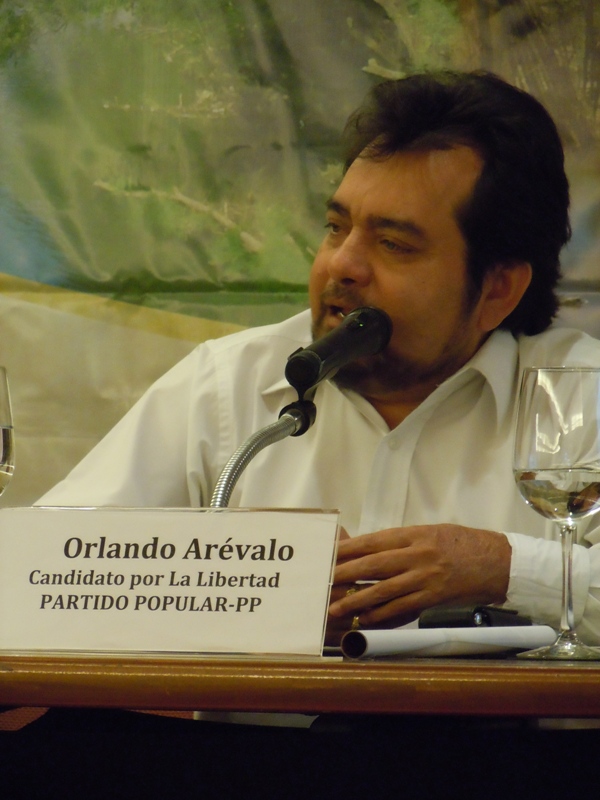 Things started heating up when it was Orlando Arevalo’s turn to speak. Rep. Arevalo has played important role in mining history in El Salvador and was the Representative who introduced the bill on behalf of the mining companies to ease mining restrictions El Salvador. At the event he said he now recognizes the dangers of mining, but that all the developed nations depended on mining to come to wealth. He also said that in life there is “your truth, my truth and the real truth.” His solution for the mining issue is that El Salvador needs to pass a constitutional reform that would allow referendums. Then there should be a referendum on population’s opinion on a mining ban. He said he would not vote on the issue until the people had been consulted. When questioned about the bill he presented in 2006, he said that he didn’t introduce it because it was his personal belief, but because he was representing his party as a whole, a statement which received jeers and laughter of disbelief from the crowd.
Things started heating up when it was Orlando Arevalo’s turn to speak. Rep. Arevalo has played important role in mining history in El Salvador and was the Representative who introduced the bill on behalf of the mining companies to ease mining restrictions El Salvador. At the event he said he now recognizes the dangers of mining, but that all the developed nations depended on mining to come to wealth. He also said that in life there is “your truth, my truth and the real truth.” His solution for the mining issue is that El Salvador needs to pass a constitutional reform that would allow referendums. Then there should be a referendum on population’s opinion on a mining ban. He said he would not vote on the issue until the people had been consulted. When questioned about the bill he presented in 2006, he said that he didn’t introduce it because it was his personal belief, but because he was representing his party as a whole, a statement which received jeers and laughter of disbelief from the crowd.
After some scathing questions from the audience, mostly directed at Rep. Arevalo, Lourdes Palacios from the FMLN ended the event by reminding Orlando Arevalo that he was the head of the Environmental Commission when the anti-mining bill was introduced and that he cannot erase his history. She also reminded the candidate from the CN that his party was the party that drafted and presented the pro-mining bill (Orlando Arevalo recently split with the CN and formed the new party he was representing at the forum) and that even if the CN candidate recognizes the harm mining causes, his party will dictate he acts according their historically pro-mining mandates.
For Spanish coverage of the forum visit the Mesa’s blog, Equilibrium.com and Contrapunto.
Photo gallery of the event.
Anti-mining Activists Pressure Candidates In Cabañas
In Cabañas, the Commité Ambiental de Cabañas and ASIC organized a similar forum directed specifically at the candidates from the department. Below is a translated article about the event.
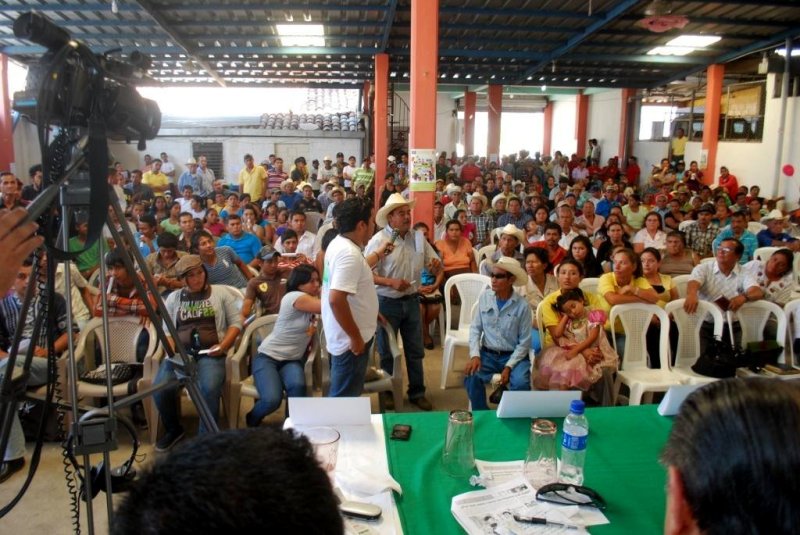
Electoral Agenda and Environmental Protection Forum
By Ludwin Iraheta
Translated by Jan Morrill
On Saturday February 25, the Environmental Committee of Cabanas in Defense of Water and Culture Association (CAC), with the support of the United Social Movement of Cabanas- Jose Benjamin Ayala and the Association Friends of San Isidro Cabanas (ASIC) held a forum called “The Electoral Agenda and Laws to Protect the Environment” and invited all the candidates to the legislative assembly from the department of Cabanas from all the political parties. The goal was learn about the proposals of each candidate with respect to the environment and their stance regarding the “death projects” like mining, as well as the bill that is stuck in the legislative assembly that aims to definitely ban metallic mining in our country.
The forum began with a speech by the president of the CAC, Francisco Pineda, who explained the goal of said forum. After, the representative from the Ombudsman for Human Right’s Office (PDDH in Spanish), the Assistant Ombudsman for the Environment Yanira Cortez Estevez spoke about the stance of the PDDH regarding mining and was clear that that organization is on the side of those who are struggling against those projects.
It is important to mention that of the six candidates who were invited, five participated (FMLN, CN, CD, PES, and ARENA) . The only party not represented was GANA. The first candidate to present his proposal was from the Cambio Democratico (CD), Benjamin Lopez, who said that once elected to the legislative assembly he will pass laws that benefit the majority of the population, and forget about party lines. He was also clear that he was against mining. Antonio Echeverria, candidate for the FMLN, said that representatives should support the law to ban mining because it has been scientifically proven that our country isn’t suitable for mining. Next it was the candidate from Conceratcion Nacional, Luis Urías´s turn to speak. He emphasized mining in his presentation but also focused on support for farmers, promoting dignified housing for those people living in extreme poverty, and said that the CN would promote laws that would revert the process of environmental degradation in El Salvador. Guillermo Guevara, from the Partido de la Esperanza, said that his work is based in the social doctrine of the Catholic Church, which entails respect for the dignity of human beings and the constant search for common good. His legislative proposal has the goal of carrying out public policy for reforestation in the department which would in turn promote a culture of natural disaster and vulnerability mitigation in the face of climate change, specifically providing protection for the aquifers of the region. The candidate for ARENA, Carlos Reyes, based his presentation on the fundamental issues which are the center of his party’s platform, like public security and education among others, but he said little or nothing about the environment or what he will do once elected.
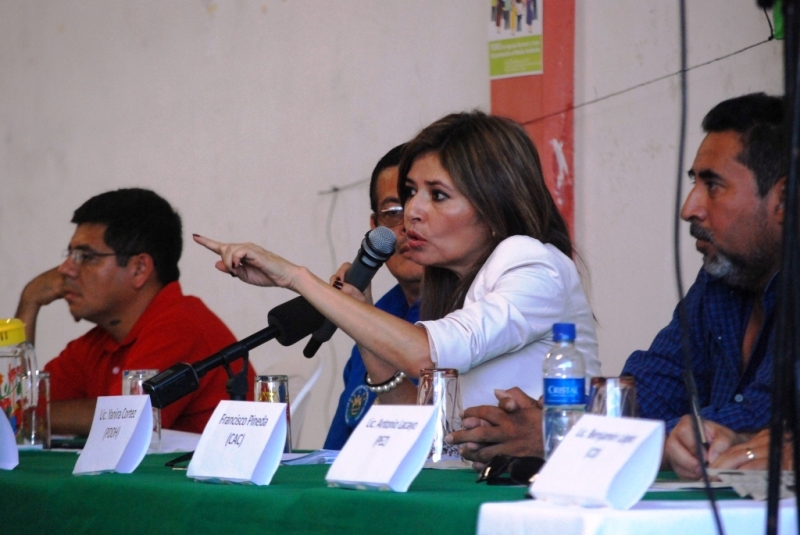 The activity was a success for the organizers because many expectations for the event were met. Firstly, because 27 communities from the entire department participated, totaling about 700 people present who listened to the different positions of the candidates. They will be able to choose the candidates who will best represent them in the legislative branch during the next elections, because they saw and heard which candidates are going to focus on the environment and who will promote legislation that will favor the people. This was the main goal of the forum, as well as the fact that the majority of candidates were present. The only candidate absent was Lorenzo Rivas from GANA who had confirmed his participation but did not attend.
The activity was a success for the organizers because many expectations for the event were met. Firstly, because 27 communities from the entire department participated, totaling about 700 people present who listened to the different positions of the candidates. They will be able to choose the candidates who will best represent them in the legislative branch during the next elections, because they saw and heard which candidates are going to focus on the environment and who will promote legislation that will favor the people. This was the main goal of the forum, as well as the fact that the majority of candidates were present. The only candidate absent was Lorenzo Rivas from GANA who had confirmed his participation but did not attend.
There was opportunity for the participants to ask questions and share their thoughts and during that part of the forum the candidate who received the most questions was from ARENA, because the people took into account the amount of time he has been in the government and that he did not do anything that benefited the poorest and most marginalized population in Cabanas. The people also asked that he state his stance in a concrete way, but in the end it was unclear why he dodged the question. Another question asked by the audience was how much the representatives earn, and the audience asked about drug-trafficking and the hogfarm in Santa Lucia that is polluting the Titihuapa River.
The event ended with another presentation by Francisco Pineda which summarized the event and clearly showed that the discourse by the political parties hasn’t change with respect to mining. He called on the communities to continue to organize because that is the only way to demand that the representatives honor what they promised once they are elected to the legislative assembly.
The activity was covered by the local, national and international press, including CNN, Ilobasco TV, Channel 9, other press that impact our department directly , as well as Guaco Radio which transmitted the forum live.
For this report in Spanish visit here.
For a coverage on the Mesa Blog visit here.
Photo gallery of the event here and here.
- Details
-
Published: Wednesday, 29 February 2012 11:39
The Environmental and Social Costs of Pacific Rim in El Salvador
As Pacific Rim continues with its law suit demanding millions of dollars from the Salvadoran Government, the economic costs resulting from the arbitration become more and more evident. Both disputing parties are paying millions of dollars in fees to the International Center for Investment Settlement Disputes, the tribunal hearing the case, as well as to their own lawyers.
However, it is important to note that there are other costs associated to the way Pacific Rim has acted in El Salvador: namely the environmental and social costs on the communities of Cabañas, the region where Pacific Rim intends to mine.
Environmental Impacts
Even though Pacific Rim never received an exploitation permit, local residents of Cabañas have documented environmental impacts caused by their exploration process.
El Salvador is one of the Latin American countries with the least access to water. There have been five cases reported of local wells and water sources drying up as a result of Pacific Rim’s exploration process. They have been reported in the small towns of Palmito, Palo Bonito, and Llano de Hacienda. The Association for Economic Social Development of Santa Marta reports that 100 families have been already been affected by the lack of water.
Francisco Pineda, Goldman Prize winner in 2011 for his work resisting mining in Cabañas, first began to investigate Pacific Rim’s actions when the stream on his property dried up. In April of 2011 he told the Nation about the moment he realized the stream was dry: “...So we walked up the river to see why…. And then I found a pump from Pacific Rim that was pumping water for exploratory wells.”
In the town of Palo Bonito, Lydia Uria lost her farm of over 500 fruit trees because the springs she used to irrigate dried up. She also was unable to continue her hog farm, which was her primary source of income. The farm was started by her late father, who received international recognition from Friends of the Earth for his efforts to plant trees due to the fact that El Salvador is one of the most deforested countries in the hemisphere. Now most of the trees have dried up from the drought.
In the municipality of San Isidro, locals claim Pacific Rim built a small dam on a local stream. Adan Martinez, whose land borders that steam, has stated that it has made his land un-farmable because during the rainy season the dam retains too much water and floods his crops.
Social Impacts
The arrival of Pacific Rim also brought divisions and conflict to Cabañas, which traditionally had the lowest crime rates in the entire country. To date there have been four anti-mining activist murdered and numerous cases of death threats and intimidation. In some of the cases there have been arrests of those hired to carry out the crimes. However, the Civilian National Police and Attorney General’s Office have never done thorough investigations into the intellectual authors of the crimes. Neighbors and families of the victims believe there could be ties to the company or company supporters.
*Marcelo Rivera’s body was found at the bottom a well in July of 2009 showing signs of torture. He was a vocal opponent to mining and other projects, such as landfills, that could bring environmental destruction.
*In December of the same year two members of the Environmental Committee of Cabañas (CAC) were gunned down in their home town. One of the victims, Dora Sorto, was eight months pregnant at the time and carrying her two year old son in her arms.
*More recently, the body of Juan Francisco Duran Ayala was found with two gunshot wounds to the head. The day before his disappearance, Juan Francisco had been hanging up anti-mining posters with other members of the CAC.
*Employees of Radio Victoria, a community radio station in the region, have been receiving threats off and on over the last three years. Radio Victoria has been an outspoken critic of local corruption and Pacific Rim’s actions in the region. Many of the radio station’s employees have 24 hour body guards and two have been forced to leave the country.
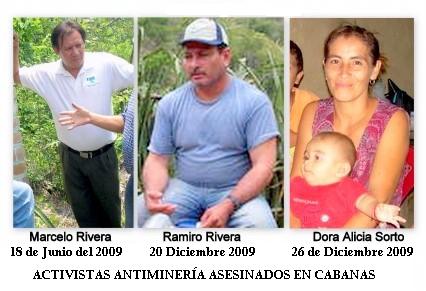
- Details
-
Published: Wednesday, 22 February 2012 16:31
Environmentalists threatened, murdered in El Salvador
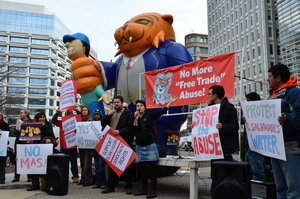
Posted Feb. 2, 2012 / Posted by: Bill Waren
Salvadoran environmentalists are fighting for a ban on destructive mining projects in the face of physical attacks at home, and legal attacks from abroad authorized by a U.S. trade agreement.
Since 2009, community leaders, staff of a local radio station and a priest have been threatened, assaulted, or intimidated for their efforts to protect El Salvador’s water, natural resources and livelihoods from harmful mining projects.
The latest outrage occurred on January 20, 2012. Father Neftalí Ruiz, a leader of the anti-mining movement, allowed into his home three young men who said they were interested in social work. Once inside, the men tied up his hands and feet. They searched his computer and went through his possessions. They stole his laptop, cell phones, and an external hard drive: all presumably containing information related to the anti-mining movement. The men did not ask for money. According to Father Neftalí, they maintained communication with a person who appeared to be directing the search of his home….
For the rest of the article click here.


 Candidates from four political parties and one independent candidate participated in the forum.
Candidates from four political parties and one independent candidate participated in the forum. Things started heating up when it was Orlando Arevalo’s turn to speak.
Things started heating up when it was Orlando Arevalo’s turn to speak.
 The activity was a success for the organizers because many expectations for the event were met.
The activity was a success for the organizers because many expectations for the event were met.
